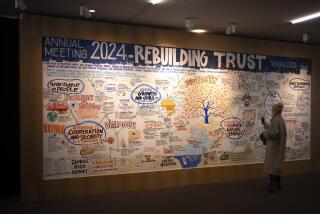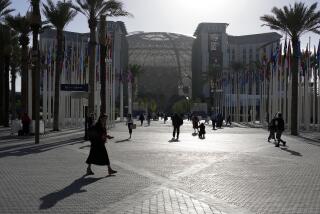To Avoid Another Seattle, Take the Time to Listen
- Share via
Government and business leaders worldwide converging in Davos, Switzerland, today for the World Economic Forum should do what the delegates to the recent World Trade Organization debacle in Seattle did not: Listen.
In Seattle, the mistakes were many. WTO delegates from developing nations were barred by larger nations from key negotiating sessions, while those from the European Union, the U.S. and other rich nations could not agree on an agenda. Meanwhile, the destructive acts of anarchists stole the spotlight from legitimate, peaceful demonstrators.
To avoid the problems that plagued that conference, I offer three lessons in listening for the delegates in Davos:
* Listen to the poor. Former President Jimmy Carter remarked recently that the most pressing problem facing the world in this new century is the gap--I would argue, chasm--between the rich and the poor. The growing discrepancy between the haves and have-nots (or as the Davos conference Web site states, the knows and know-nots) is staggering. In the 1970s, people in wealthy countries were 30 times better off than those in poor countries; today, they are 74 times wealthier, according to the United Nations.
Those still waiting on the shoulder of the Information Superhighway can offer unique insights to the Davos delegates. I’ve gained wisdom about economics from people I’ve met in the slums of Nairobi and Manila, people who consider electricity and phone service luxuries. Among them are people who have been given a helping hand with “microeconomic” loans used to create new and successful businesses that have enabled them, their families and their communities to become self-sustaining.
Similar insights may well be gained from delegates from countries like Peru or Bangladesh or Uganda. By giving those individuals the floor at the forum, Davos delegates would receive both a mild rebuke for not sharing the wealth in abundance in the Western world and also an open invitation to invest in the developing world. These investments should be long-term ones that create safe and healthy working environments and improve local and national economies, not sweatshops for manufacturing Pokemon paraphernalia.
* Listen to the concerns about children. The International Labor Organization estimates that more than 250 million children ages 5 to 15 work full-time or part-time somewhere in the world every day. Many millions of these children are working under exploitative and hazardous conditions as prostitutes, bonded laborers, welders or rubbish pickers. Moreover, many of these children carry the double stigma of being orphaned by one of the greatest plagues of the last century: AIDS. Many children travel miles to school or jobs or to seek safety from conflict and poverty.
Last June, ILO delegates approved without dissent a new treaty, the Convention on the Worst Forms of Child Labor. The agreement applies to children under 18 and is part of a multipronged approach to help eliminate the enslavement, sale and trafficking of children; the offering of children for prostitution; and the forcible recruitment of children for armed conflict. I challenge the Davos delegates representing national governments to discuss and ratify this agreement and commit themselves to persuading their countries to enforce it as law.
* Listen to the weak. Recognize that some countries that appear to be foundering economically today may gain a significant market share in one or more areas in the future. The delegates should not regard trade policies with the naive premise that a country either has a comparative advantage in something or does not. Such an advantage can be acquired.
For example, 40 years ago no one would have said that South Korea had a comparative advantage in steel production. It did not have the raw materials and had only a small domestic market. In the 1970s, the World Bank even turned down South Korea’s request for a loan to set up a steel industry. The South Korean government went ahead with its Pohang Iron & Steel Co. Ltd. in 1973 with an initial investment of $3.6 billion. Today, the resulting conglomerate is the world’s largest and, arguably, most efficient steel producer, ahead of any in the United States.
World Bank President James Wolfensohn, in an address at the recent WTO meeting, called on delegates to “seize the day” in new and dramatic ways for the developing world. The delegates in Seattle clearly believed that they did not need to listen. The delegates in Davos cannot afford not to.
More to Read
Inside the business of entertainment
The Wide Shot brings you news, analysis and insights on everything from streaming wars to production — and what it all means for the future.
You may occasionally receive promotional content from the Los Angeles Times.










